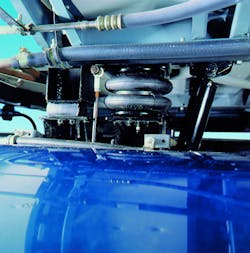General air spring maintenance tips for heavy duty trucks and trailers
Overall, air suspensions reduce the amount of wear and tear on trucks and trailers and contribute to a longer cab and vehicle life, lower operating costs and less downtime, observes Dave Vanette, manager, new business development, Firestone Industrial Products Company, which specializes in air spring manufacturing and technology for heavy duty trucks and trailers, cars, pickup trucks, buses, rail cars, and industrial uses. www.firestoneindustrial.com. Air suspensions also reduce vibration and curtail costly maintenance and repairs to the truck.
"Air suspension systems require a minimal amount of maintenance that can be performed during other routine vehicle maintenance service," he says. "As an added benefit, if an air spring fails, a trailer can still be pulled at slow speeds, whereas a trailer with leaf springs becomes immediately inoperable.
Vanette says that as with all components of trucks and trailers, performing routine preventative maintenance inspections on air springs is one of the best ways to guarantee maximum life and performance.
INSPECTIONS
Truck drivers or maintenance personnel should perform basic walkaround inspections - from daily to once a week - to ensure that the suspension is fully operational, advises Vanette. Be sure there are no signs of irregular wear, tears or heat cracking on the air spring, and that nothing is touching it or interfering with its movement.
Further, he recommends checking:
- For buildup of dirt, debris or rust or corrosion on the piston. This can create a surface similar to sandpaper and wear down the air spring.
- For oil, grease or dirt buildup on the air spring itself. If any buildup is found on the piston or the air springs, these parts should be cleaned using soap and water, methyl alcohol, ethyl alcohol or isopropyl alcohol – "the only industry-approved cleaning solutions for air springs."
- Air springs for sufficient and equal pressure, and to sure that the suspension is set at proper ride height.
Every 100,000 miles, or once a year - whichever comes first, the air spring suspension system of a semitrailer should undergo a routine maintenance inspection, Vanette says. These inspections include the steps taken in the aforementioned basic inspections, plus a more in-depth examination of the rest of the air suspension system.
"The air springs should be fully inflated during these inspections and examined closely for leaks. If the inspector notices even the slightest air leak, the air spring will need to be replaced.
"The inspector should also check to ensure that there is sufficient clearance around the complete circumference of the air spring when it is inflated to its maximum diameter."
About the Author

